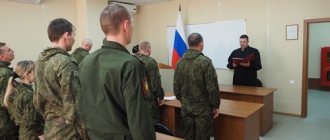Commentary on Article 337 of the Criminal Code of the Russian Federation
Commentary edited by Rarog A.I.
1. Unauthorized abandonment of a unit or place of service should be understood as the departure of a serviceman from this unit or place of service without the permission of the superior (commander) or other legal grounds. Absence lasting more than two days, but not more than ten days is a crime under Part 1 of Art. 337 CC.
2. Provided for in Part 1 of Art. 337 of the Criminal Code, failure to appear for service on time upon dismissal from a unit, upon assignment, transfer, from a business trip, vacation or medical institution implies that, in contrast to unauthorized abandonment of a unit or place of service, the serviceman left the place of service or unit on a lawful basis, and failure to return on time is not caused by any valid reasons.
3. The crime is considered completed from the moment the serviceman is absent without good reason from the unit or place of service for the period established in Part 1 of Art. 337 of the Criminal Code of the term.
4. The subjective side presupposes the presence of direct intent.
5. The subject of the crime is a special one - a military serviceman undergoing military service upon conscription.
6. The qualified crime is provided for in Part 2 of Art. 337 of the Criminal Code: commission of the same act by a serviceman serving a sentence in a disciplinary military unit.
7. The subject of this crime is a military serviceman serving a sentence in a disciplinary military unit.
8. Part 3 of Art. 337 provides for unauthorized abandonment of a unit or place of service, as well as failure to appear on time without good reason for service for a duration of more than ten days, but not more than one month.
9. Unlike Part 2 of Art. 337 of the Criminal Code in this composition increases the period of absence from the unit or place of service (from more than ten days to one month), and not only the military serviceman undergoing military service on conscription, but also serving under a contract, becomes the subject of the crime. Thus, criminal liability for the acts in question for a serviceman performing military service under a contract occurs in the absence of a unit or place of service for more than ten days, while for a serviceman undergoing military service on conscription, criminal liability is provided for in the absence of duty station or unit for more than two days (Part 1 of Article 337 of the Criminal Code), and in the absence of more than ten days it only intensifies (Part 3 of Article 337 of the Criminal Code).
10. Part 4 of Art. 337 of the Criminal Code establishes a more severe punishment for committing acts provided for in Part 3 of Art. 337 of the Criminal Code, lasting more than one month.
11. In the note to Art. 337 of the Criminal Code contains a provision that a serviceman who has committed the acts provided for in this article for the first time may be exempt from criminal liability if the unauthorized abandonment of the unit was a consequence of a combination of difficult circumstances.
12. A combination of difficult circumstances means the sudden death or serious illness of the parents and other close relatives of a serviceman, a natural disaster at their place of residence requiring the urgent arrival of a serviceman to provide the necessary assistance, serious conflicts in the family that threaten its disintegration, etc.
Commentary to Art. 337 Criminal Code
1. The objective side consists of unauthorized, i.e. without the appropriate permission of the commander (chief) leaving the unit or place of service or failure to appear on time for service without good reason (clauses 10 - 11 of the Resolution of the Plenum of the Supreme Court of the Russian Federation of April 3, 2008 No. 3 “On the practice of courts considering criminal cases of evasion conscription for military service and from performing military or alternative civilian service").
2. Unauthorized abandonment of a unit or place of service, as well as the failure of a serviceman to appear, must last more than two, but not more than ten days. If a person was absent without permission or did not appear for more than two days, the act is not criminally punishable, but is recognized as a gross disciplinary offense.
3. Unauthorized abandonment of a unit or place of service or failure to appear must be carried out by a military personnel without valid reasons (clause 24 of the Resolution of the Plenum of the Supreme Court of the Russian Federation of April 3, 2008 No. 3).
4. The crime is recognized as completed from the moment of unauthorized abandonment of the unit or place of service, as well as the failure of the serviceman to appear within the period established by law, i.e. after two days.
5. The subject of the crime provided for in Part 1 is a military serviceman undergoing military service upon conscription.
6. Part 2 contains additional characteristics of the subject of the crime - he is a military serviceman serving a sentence in a disciplinary military unit.
7. Part 3 establishes a longer period for unauthorized abandonment of a unit or place of service or failure to appear by a serviceman - more than ten days, but not more than one month.
The subject of this crime, along with a serviceman performing military service on conscription, is also a serviceman performing military service under a contract. If a soldier performing military service under a contract was absent for less than ten days, he bears disciplinary rather than criminal liability.
8. Part 4 increases the criminal liability of a serviceman who has been absent for more than one month.
9. The note contains a special type of exemption for a serviceman from criminal liability.
Objective signs
Any act provided for by the disposition of the norm of the particularity of the Criminal Code of the Russian Federation presupposes the presence of mandatory signs that form the composition of a dangerous attack. The absence of one of the elements makes it impossible to initiate a criminal case. Accordingly, the corpus delicti is the basis for holding a person accountable.
The law provides for two groups of mandatory elements for a crime: objective and subjective.
The first category of elements of a socially dangerous act relates to how the action manifests itself in the external environment and what the criminal is encroaching on. This includes the object and the objective side, which also, in turn, have their own distinctive features. And the first thing that should be said is that social relations suffer from crime.
Article 337 of the Criminal Code of the Russian Federation with comments and judicial practice of the Russian Federation can determine the peculiarity of an object when trying to leave the location without permission
The immediate object is the procedure for fulfilling military duty, that is, the entire system of passing through the army suffers, and it does not matter whether it is a contract option or a conscription option. The only difference is that conscripts cannot be absent for more than two days, while contract soldiers are given a whole month of limitation to bring them to justice.
Another important point is the objective side.
This criterion may have several variants of expression, taking into account the provisions of the article in question:
- Leaving the place of service. Here we are talking not only about the military location, but also about the specific place where the serviceman should be; these objects do not always coincide (military unit, medical institution, place of business trip). In this case, the fact of an attempt to leave the duty station without a direct instruction from the commander is important. Only such actions will be considered illegal and fall under the norm in question.
- Failure to appear at the location. This also includes cases when a serviceman legally left the location, but did not return at the time established for him. Even under this condition, he will fall under the scope of this article if the period of absence corresponds to that specified in the disposition of the norm.
The proposed options usually exist separately from each other. In fact, these are variants of violations that will lead to the application of punishment.
It is also important to determine how long the person’s absence should be. According to the article in question, the minimum period for a person to remain outside the place of duty is two days, the maximum period is determined by individual provisions of the article. For example, under Part 1 the upper limit is set at ten days, and under Part 3 and Part 4 the period reaches one month or more.
The corpus delicti in this case is recognized as formal and completed from the moment the person returned in violation of the terms of absence or was caught outside the location. Moreover, the occurrence of any negative consequences is not necessary to establish the composition of this act.
Separately, it should be said about references to administrative legislation. It is mistakenly believed that the insignificance of a serviceman’s offense can exempt him from criminal sanctions. The Code of Administrative Offenses does not provide for such an offense as abandonment of service; administrative penalties are possible only if there is an encroachment on the military registration procedure.
What does judicial practice show under Art. 337
Crimes against military service cannot be called widespread in the Russian Federation. In total, 1,736 such criminal cases were considered in 2021. Of the total number, only a few related to leaving the place of duty and late reporting to the unit.
Nevertheless, examples of this can be given:
- Conscript S. was given leave for a period of 24 hours. After this time, he did not report to the unit. He did not return for the next 48 hours. 4 days after the expiration of the leave, S. was detained by patrol and taken to his place of duty. In the actions of the private, the composition provided for in Art. 337 part 1. He was sentenced to serve a sentence in the disbat for a period of 4 months.
- Citizen N., serving in the ranks of the RF Armed Forces under a contract, did not return from his next vacation. After 10 days from the moment of failure to appear, he was put on the wanted list and was detained by the police. The investigation saw in N.’s actions the elements of a crime under Art. 337 part 3. The court agreed with the arguments of the investigation and imposed a punishment in the form of service in the disbat for a period of 1 year.
- Private R. did not return to his unit at the required time after his leave. 48 hours later he was put on the wanted list. R. managed to escape punishment. As it turned out, he intended to arrive at the unit on time, but unforeseen circumstances prevented this. The reason for his failure to appear was that R. was hospitalized as a result of being stabbed. He was unable to notify the command in a timely manner, as he was in an unconscious state. The criminal case was closed due to the lack of evidence of a crime.
The possibility of bringing military personnel to justice largely depends on the command of the unit. Often, careless soldiers are punished disciplinaryly, in accordance with the provisions of the Charter, for example, with extraordinary assignments. Of course, this is relevant if the serviceman does not show up for several days, not months.
What determines the severity of punishment?
Each part of Art. 337 contains a list of possible penalties. At the same time, the maximum possible punitive measures are indicated. For example, the maximum punishment for an unlawful act provided for in Part 3 is imprisonment for a period of 3 years. The maximum possible punishment is rarely imposed. The court prefers to limit itself to a less severe punishment. What determines the size of the punishment that the court chooses?
In this situation, the amount of harm caused by the act is of primary importance. The higher it is, the more serious the punishment will be. It is reasonable to believe that a soldier who returns from leave at the wrong time will cause much less harm than a soldier who left the unit just before guard duty.
Mitigating and aggravating circumstances
When studying military crimes, mitigating and aggravating circumstances are taken into account. At the same time, when considering criminal cases under Art. 337, according to the note to the criminal norm, some mitigating circumstances may be a reason for exemption from liability.
Among the mitigating circumstances applicable to Art. 337, should include:
- committing a crime for the first time;
- presence of small children;
- confession;
- committing a crime as a result of moral or physical torture.
Aggravating circumstances include:
- repeat crime;
- committing a criminal act as part of a group;
- committing a crime in emergency situations.
The lists of mitigating and aggravating circumstances are not exhaustive. All circumstances of this kind are considered by the court on an individual basis.
Second commentary to Art. 337 of the Criminal Code of the Russian Federation
1. Leaving a military unit or place of service without the permission of the commander (superior) is recognized as unauthorized.
2. The territory of a military unit is the place where a military unit is located in a barracks, camp or field location. The place of service, if it does not coincide with the territory of a military unit, is understood as the place where the serviceman actually performs the duties of military service.
3. Failure to appear for duty on time means that a serviceman, having left the military unit on a legal basis (dismissal, business trip, leave, treatment in a medical organization, etc.), fails to report to the unit or to the unit or to the unit on time without good reason. place of duty.
4. Valid reasons for failure to appear may be the illness of the serviceman or his close relatives, etc.
5. The duration of unauthorized abandonment of a unit is calculated from the moment the serviceman leaves the unit or place of service (in case of failure to appear for duty on time, from the moment the deadline for appearance expires) and until the moment of his return or detention.
6. From the subjective side, the crime is committed intentionally.
7. The corpus delicti provided for in Part 1 consists of unauthorized abandonment of a unit or place of service (failure to appear for duty on time without good reason) for a duration of more than two days, but not more than ten days. The subject of the crime is a military serviceman undergoing military service upon conscription.
8. Part 2 art. 337 is applied for unauthorized abandonment of a unit or place of service (failure to appear on time for service without good reason), committed by military personnel sentenced to detention in a disciplinary military unit, after their arrival at the disciplinary military unit to serve their sentence.
9. Part 3 art. 337 establishes criminal liability for unauthorized abandonment of a military unit or place of service, as well as failure to appear on time for service without good reason for military personnel undergoing military service by conscription or contract, lasting more than ten days, but not more than one month.
10. In relation to military personnel undergoing military service under a contract (Parts 3 and 4 of Article 337), failure to appear for service without good reason should be recognized not only as failure to appear at appointment, transfer, from a business trip, vacation or medical institution, but also non-arrival specified persons for service at the time established by the regulations of service time or by order (instruction) of the commander (chief).
11. According to Part 4 of Art. 337 qualifies as unauthorized abandonment of a unit or place of service, as well as failure to appear on time without good reason for service lasting more than one month, committed by military personnel undergoing military service on conscription or under a contract.
12. As a confluence of difficult circumstances specified in the note to Art. 337, cases of sudden serious illness of the serviceman himself or his close relatives, serious family conflicts, etc. can be recognized.
Judicial practice under Article 338 of the Criminal Code of the Russian Federation.
- 1.
Decision No. 2A-6934/2018 2A-6934/2018~M-7182/2018 M-7182/2018 dated October 30, 2021 in case No. 2A-6934/2018
Abakan City Court (Republic of Khakassia) – Civil and administrative
...Start of the term 12/26/2016, end of the term 12/25/2018. Previously convicted: 05/29/2007 by the Abakan Garrison Military Court of the Republic of Khakassia under Part 1 of Art. 338, part 3 of article 69, article 701 of the Criminal Code of the Russian Federation to 5 years in prison; 07/21/2010 magistrate judge of judicial district No. 2 of Sayanogorsk, Republic of Khakassia, according to...
- 2.
Sentence No. 1-35/2018 of October 19, 2021 in case No. 1-35/2018
Zaozersky Garrison Military Court (Murmansk Region) – Criminal
...registered and residing at the address: , accused of committing four crimes under Part 3 of Article 159 of the Criminal Code of the Russian Federation and one crime under Part 1 of Art. 338 of the Criminal Code of the Russian Federation, established: A.V. Aminov, undergoing military service as the head of the first crew of unmanned aerial vehicles of an unmanned aerial vehicle company...
- 3.
Appeal decision No. 22-1505/2018 dated October 16, 2018 in case No. 22-1505/2018
Yaroslavl Regional Court (Yaroslavl Region) – Criminal
... of the Criminal Code of the Russian Federation to 12 years in prison, under paragraph “c” of Part 4 of Art. 162 of the Criminal Code of the Russian Federation to 9 years in prison, under Part 1 of Art. 338 of the Criminal Code of the Russian Federation to 3 years in prison, in accordance with Part 3 of Art. 69 of the Criminal Code of the Russian Federation - to 16 years of imprisonment in a maximum security correctional colony. Convict...
- 4.
Appeal decision No. 22-1211/2018 dated October 10, 2018 in case No. 22-1211/2018
Supreme Court of the Republic of Khakassia (Republic of Khakassia) – Criminal
...convicted: on May 29, 2007 by the court (taking into account the court ruling dated September 16, 2011) under Part 1 of Art. 338, part 3 art. 30, paragraph “g”, part 2, art. 161, paragraph “d”, part 2 of Art. 161 of the Criminal Code of the Russian Federation (as amended by Federal Law No. 26-FZ of 07.03….
- 5.
Appeal decision No. 22-851/2018 dated October 8, 2021 in case No. 22-851/2018
Court of the Yamalo-Nenets Autonomous Okrug (Yamalo-Nenets Autonomous Okrug) – Criminal
... the year in which Bochkarev FULL NAME9, born DD.MM.YYYY in, convicted: 1. March 27, 2008 by the Ulyanovsk Garrison Military Court under Part 1 of Art. 338 of the Criminal Code of the Russian Federation to 2 years 6 months of imprisonment; released by order of the Dimitrovgrad City Court of the Ulyanovsk Region dated August 6, 2009 on parole for 1 year...
- 6.
Verdict No. 1-58/2018 of September 25, 2021 in case No. 1-58/2018
Arzgirsky District Court (Stavropol Territory) – Criminal
...conditional early release, the court grants conditional early release based on the verdict of 09/07/2016 of the Budennovsky Garrison Military Court of the Stavropol Territory under Part 1 of Art. 338 of the Criminal Code of the Russian Federation, on the basis of paragraph “b” of Part 7 of Art. 79 of the Criminal Code of the Russian Federation, save. Makarov M.G. is not on specialized medical records. According to the conclusion of the forensic psychiatric examination No. ...
- 7.
Verdict No. 1-69/2018 of September 18, 2021 in case No. 1-69/2018
Tashlinsky District Court (Orenburg Region) – Criminal
...at the address, ....., previously convicted: - by the verdict of the Perm Garrison Military Court of April 17, 2007 under: Part 3 of Art. 337 of the Criminal Code of the Russian Federation; Part 1 Art. 338 of the Criminal Code of the Russian Federation, finally to punishment in the form of imprisonment for a term of 2 years; – by the verdict of the Gornozavodsky District Court of the Perm Territory dated January 21, 2008 under Part 4...
- 8.
Verdict No. 1-12/2018 of September 14, 2021 in case No. 1-12/2018
Tver Garrison Military Court (Tver Region) – Criminal
... of the Russian Federation (hereinafter referred to as the Criminal Code of the Russian Federation) and subsequently held in custody as a preventive measure chosen for him, accused of committing crimes under Part 1 of Art. 338, part 2 art. 228, part 3 art. 30 p.p. “g, h, j” part 2 art. 105, pp. “a, c” part 4 art. 162 of the Criminal Code of the Russian Federation, ...
- 9.
Sentence No. 1-15/2018 1-179/2017 dated September 12, 2021 in case No. 1-15/2018
Krasnouralsk City Court (Sverdlovsk Region) – Criminal
...RF to 2 years 6 months imprisonment; – 09.09.2009 Novorossiysk Garrison Military Court of the Krasnodar Territory under Part 3 of Art. 337. Part 1 art. 338 of the Criminal Code of the Russian Federation, using Part 3 of Art. 69 of the Criminal Code of the Russian Federation to punishment of 1 year 6 months of imprisonment; on the basis of Part 5 of Art. 69 CC...
- 10.
Sentence No. 1-22/2018 of September 12, 2021 in case No. 1-22/2018
Krasnoyarsk Garrison Military Court (Krasnoyarsk Territory) – Criminal
…of the year; undergoing military service under a contract that entered into force on September 1, 2015 for a period of 3 years, accused of committing a crime under Part 1 of Art. 338 of the Criminal Code of the Russian Federation, established: Gladkov V.A. On March 22, 2021, not wanting to fulfill the duties of military service, in order to evade its completion, did not appear without valid excuses...
Pages← previousnext →
- 1
- 2




